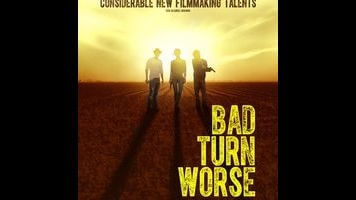Well, it’s good to have role models. Thing is, though, adapting Thompson’s novels is tricky enough—only a tiny handful (most notably 1990’s one-two punch of After Dark, My Sweet and The Grifters) have been worthwhile. Here, Southern tries his hand at inventing, from scratch, a typical Thompson tale of petty larceny gone wrong, and can’t achieve anything close to the correct flavor. For one thing, the narrative would barely fill out a short story: Sue’s boyfriend and Bobby’s best friend, B.J. (Logan Huffman), robs $20,000 from his psychopathic employer, Giff (Mark Pellegrino), who then forces him—along with Bobby and Sue, who unwittingly helped B.J. spend the money—to rob Giff’s own boss, Big Red (William Devane). Refreshingly, Bobby and Sue, who are both headed off to college in the big city, quickly decide to go to the authorities, only to discover that small-town Texas law enforcement isn’t always super keen on enforcing the law.
Bad Turn Worse has one genuinely great scene, in which Jon Gries (best known as Napoleon Dynamite’s Uncle Rico), playing the town’s sheriff, attempts to get across to Bobby that he’s bought and paid for by the very guy they’re so afraid of, without actually saying those words out loud. It’s a beautifully sustained minute of veiled confession and dawning comprehension. Mostly, though, the film bears less resemblance to Jim Thompson than it does to any number of forgotten ’90s thrillers featuring jolly sadists. Pellegrino can be an arresting actor—he even largely managed to pull off Lost’s overly mysterious Jacob—but here, he’s given one absurd talking-killer scene after another, at one point even staging a potential gang rape of Sue as if it were a game show, which is the sort of thing only villains in bad movies do. Of the three young leads, only Davis, a beguiling mix of tough and tremulous who’s one key role away from major stardom (her ’80s programmer on Halt And Catch Fire wasn’t it, apparently), manages to make a strong impression. Had the film not been so open about its ambition, maybe its mediocrity wouldn’t seem quite so galling.









































